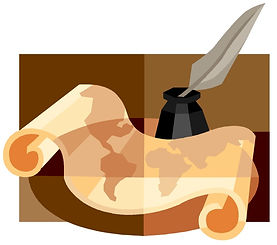WISCONSIN FUTURE PROBLEM SOLVING
CREATIVE WRITING
(formerly Scenario Writing)
Is creative writing your thing?
Then writing a futuristic story may be for you!
What is Creative Writing?
Creative Writing is an individual competition in which students develop short stories related to one of the four FPS topics for the year. The story is set at least 20 years in the future and is an imagined but logical outgrowth of actions or events taking place in the world today. The story should focus on one main character and develop that character through the plot of the story.
Why Creative Writing?
Today’s students will spend most of their lives in the 21st century. Our job as educators is to prepare students to think critically about the future and to create images of what the future may be like. Through creative writing stories, students are able to enlarge, enrich, and make more accurate those images of the future, while honing their creative writing skills.
Who can participate in Creative Writing?
Students may participate in Creative Writing in three divisions: Junior (grades 4-6), Middle (grades 7-9), and Senior (grades 10-12). For students who participate in the regular or curricular components of Future Problem Solving, Creative Writing can serve as an excellent complement to their work on any of the topics used during the year. Creative Writing is also an excellent offering for students who do not participate in other components of FPS; the creative writing involved may appeal to students who are not drawn to the team orientation of the other components. Creative Writing can be used as a stand-alone activity by an FPS coach, an English teacher, or any other instructor with students who are interested in writing stories.
Do students need to know the 6-step process for Creative Writing stories?
Although knowing the process can help students to think about the future, it is not a prerequisite for Creative Writing. However, the stories must relate to one of the year’s topics, so students should do some background reading about the topic they select for their story. The Readings, Research, & Resources manual from the FPSP Catalog Company contains article summaries for the topics, but students may also do their own research in publications.
How can I get started with my students?
The best way to become acquainted with Creative Writing is for you and your students to read many of them. Check the sales page for stories written by Wisconsin students. A Scenario Writing Guide is available at fpspimart.org.
How much help should I give?
The student’s writing must be original. As coach, you may read the student’s work, ask questions that occur to you as a reader, and make general suggestions for improvement. All authors should receive adult help to correct all spelling, grammar, and punctuation.
How do I register students for Creative Writing?
Go to the Registration and Fees page for information on the Creative Writing competition and enry forms for submitting work. Entries are due in mid-January.
How are the stories evaluated?
State evaluators read the stories in January and February. The aspects they consider include mechanics/structure, audience, purpose, style, idea development, character development, creative thinking, and futuristic thinking. The top three stories in each division are published in a booklet by the Wisconsin FPS Program. Their authors are invited to attend the State Bowl to read their stories following the Opening Ceremony and to participate in a Team Writing event.
See REGISTRATION & FEES for participation information and entry forms.

Excerpt from
Skittles for Calisto
Middle Division 2007
Topic: Cultural Prejudice
1st Place, Wisconsin FPS
1st Place, International FPS
Earth humans are dumber than space rocks. Earth humans are short, with piggy little eyes, stupid clothes, and they listen to horrible music. You may ask: why am I different from them? Well, because I’m a Martian. No, I am not an alien. I’m a human… a real human. The humans that never left that ugly blob they have the audacity to call The Blue Planet are so yesterday. Me? I’m an all-Martian girl. I’m a human of today.
Here’s the deal. In 2031 a colony of two hundred people was established on Mars, Colony Olympus. My mother, Marusu Sasaki, was the very first baby ever born on Mars. In the eyes of the Earthlings, she was nothing short of a goddess. A couple of decades later, she married my dad and had me, Calisto Sasaki. My parents nicknamed me Cali when I was little, but no one who wanted their skull to stay intact ever called me that in public.
Anyway, I grew up on Mars, where there is a reasonable amount of gravity, instead of bowling-ball weight, where you wear an oxygen tank and a space helmet whenever you go outside, where it’s nice and cool instead of boiling hot, where you work as a team and stay in a dark, tight space instead of the dizzying openness of Earth’s atmosphere. I didn’t think it would be so bad when my mom decided we should launch on the four-year journey to the Blue Planet, but now, two months after the landing, I’d give anything to be back on Mars.